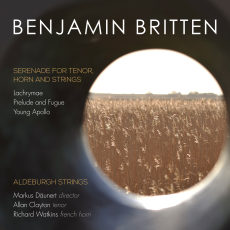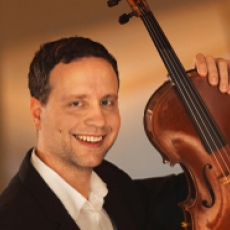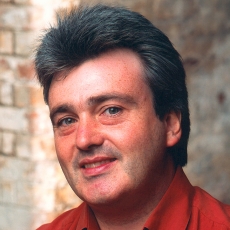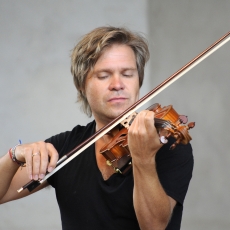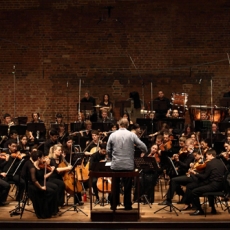Aldeburgh Strings - Britten: Serenade - Fanfare
Here is a superb collection of four contrasting examples of Benjamin Britten's music for string orchestra, written in the composer's remarkably fecund period during World War II and just after. It was recorded as the culmination of three extended "weekend" convenings, in 2012, 2013, and 2015, of the Aldeburgh Strings. This outstanding chamber orchestra is an ensemble of the Britten-Pears Young Artist Programme, designed to give "the world's best emerging professional musicians" high-level mentoring and performance experience. As one might expect, they are a thoroughbred ensemble, full of the energy of artistic rivalry and new discovery. Probably not a jaded back-desk player to be found, and it shows. Central to the mission of the program is the interaction between participants and top-level soloists and section mentors. So we have violinist Markus Däunert, founding member and former co-leader of the Mahler Chamber Orchestra, as director for this project; Richard Watkins, former principal horn of the Philharmonia Orchestra, and current member of the Nash Ensemble and London Winds, as soloist; and Máté Szücs, principal solo viola of the Berlin Philharmonic, who in addition to soloing in Lachrymae for viola and strings, served as viola tutor for the ensemble. Soloists tenor Allan Clayton and pianist Lorenzo Soulès are outstanding younger artists: recent competition winners and in-demand performers.
The Serenade is, of course, the undisputed masterpiece of the four works gleaned from these concerts and subsequent recording sessions, but all of the works are imposing achievements, even the composer's Young Apollo, the quickly suppressed paean to the sun god, or some admired equivalent. The 2015 iteration of the ensemble is bold and incisive in this unusual fanfare for piano and strings, and Soulès demonstrates the power and bravura that no doubt contributed to his sweep of the 2012 Geneva Competition. Szücs is searching and elegiac in the continuous variations on Dowland's If My Complaints Could Passions Move that form Lachrymae, performed in the orchestration which Britten created in his last year. The 2012 version of the ensemble is particularly impressive in the hushed sections, playing with exquisite beauty and control here, as well as in the Prelude and Fugue for 18 Strings. The Fugue is further notable for the precision of execution and the full rich sound achieved in the generous acoustic of the Maltings, Snape.
But it is the Serenade for Tenor, Horn, and Strings, recorded in 2013, that is the pearl of the set, as much for Clayton's grippingly text-aware delivery of the songs as for the breathtaking playing of Watkins in the horn solos. There is ample recorded competition for all of these works, but most especially for the Serenade, beginning with the recording made by the soloists for whom it was written, Dennis Brain and Peter Pears. Watkins is every bit the equal of any previous soloist I know, in the precision of rhythm and intonation-those natural harmonics perfectly tuned-but especially in the imaginativeness of his phrasing and sheer glory of his sound. It speaks volumes for Clayton that his sensitive and intelligent readings aren't overshadowed by his partner.
Is it perfect? No, not quite. Clayton could employ more variety of color, especially at lower volumes. I would have liked more ferocity from the strings in the storm that breaks mid-way through "Dirge" in the Serenade, and surely these young musicians will find more heartbreak in the Lachrymae with greater life experience. But small complaints do not diminish admiration for the whole. What wonderful work the Britten-Pears Young Artist Programme is doing, and what a joy to hear the result so beautifully presented. The timing is short at 55 minutes, but there is an offer with the disc for a free download of a fine performance of Vaughan William's Fantasia on a Theme of Thomas Tallis recorded by the 2012 ensemble. It is available in a variety of resolutions; I found the 24-bit/192kHz FLAC quite impressive.
